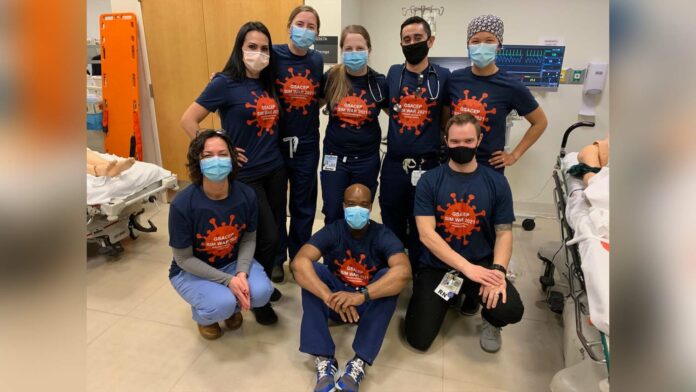A team of UC Davis Air Force residents beat out residents from Navy, Airforce and Army programs across the country in a military medicine simulation
On April 8, 2021, the emergency medicine physicians in the UC Davis Emergency Medicine Residency program participated in a head-to-head competition against military emergency medicine residents from across the country. The competition, called “SimWars,” was organized by Air Force Lt. Col. Dr. Roderick Fontenette, the military associate program director at UC Davis Health.
“The SimWars competition is a competition against military emergency medicine residents from across the country—it’s Army, Airforce and Navy residents,” Fontenette said.
The competition was part of the annual Government Services Symposium organized by the Government Services Chapter of the American College of Emergency Physicians. The SimWars competition gives residents from across the country and across the branches of the military the opportunity to compete against one another in simulated patient scenarios. This year, more than 30 residents from seven teams competed in the SimWars. Each participating team, including the Air Force team from UC Davis, was composed of emergency medicine residents, varying from first-year to fourth-year residents, as well as registered nurses and respiratory therapists.
This year’s competition and conference differed from previous years as it had to be hosted online remotely. Every team competed from their home campus, using scenarios written by Fontenette and their home facility’s simulation centers. Some schools had to drop out due to these technical constraints, dropping the number of teams from nine to seven, according to Fontenette.
The simulated scenarios were designed to resemble situations that military physicians are likely to encounter in the battlefield, but ones that civilian physicians might not ordinarily face.
“They were real cases,” Fontenette said. “It was a mass casualty event, multiple patients coming in. First patient came in after stepping on an IED, had traumatic amputations, had to be intubated, altered mental status, most likely a traumatic brain injury. Then the other patient came in, penetrating gunshot wound to the left chest with a reported 13 other patients coming in. Just like you would take care of the patients in Afghanistan or the Horn of Africa, you had to take care of your patients because these are all military residents and I wanted to make sure they had military-type scenarios.”
In order to complete these scenarios, each team had to utilize their facility’s simulation labs, employing high-fidelity manikins that can “produce pulses, heart rates, hemorrhages, sweat, vomit and speak,” said Dr. Ian M. Julie, an associate professor of emergency medicine and the medical director of the simulation center at UC Davis, via email. These high-fidelity manikins were ideal for this type of simulation because they could be programmed to meet the needs of the SimWars scenario.
“If you want practice cutting open a chest and repairing an injured heart, you need an animal model,” Julie said via email. “But if you want dozens of medical students to practice assessing a very sick asthma patient who requires diagnosis, medication and intubation, […] a manikin can do it repeatedly, the same way every time and without ethical dilemmas.”
These simulation manikins allowed each team across the country to have a patient with the same vital signs that responded the same way to any interventions. The UC Davis residents completed and filmed their scenarios in the UC Davis Health Center for Simulation and Education Enhancement. During the pandemic, the center was modified to incorporate virtual learning so it had all the equipment needed to compete in the SimWars and record every step along the way using Zoom-enabled workstations and wall-mounted cameras.
Air Force Capt. Dr. Jasmine Neeno, a third-year emergency medicine resident at UC Davis, was the team lead for the UC Davis team. Neeno led the team to victory this year, narrowly beating out the Army team from the Medical College of Georgia.
“We did a really good job of communicating and listening to suggestions and advice when we had difficult patient situations, which I think is what ultimately carried us to victory,” Neeno said. “[All teams] practice similar medicine, but I think the difference was that I felt that we worked better as a team.”
As the UC Davis residents celebrate their victory this year, they look forward to returning back to an in-person conference and competing again next year to defend their title.
Written by: Justin Weiner — science@theaggie.org





